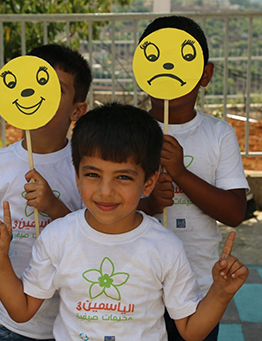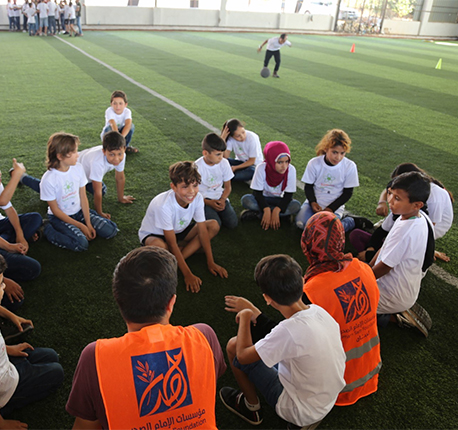
Close

Lebanon, by virtue of its structure, is one of the most vulnerable countries to outside influences.
Lebanon is especially vulnerable to threats as it sits at close quarters to hubs of instability. Our prayer for our country is for it to be a model for peace and love to all humankind, but we have been so far destined to watch as it slips steadily towards the abyss of brutality and hatred.
Lebanon became infamous as a result of the civil war which erupted in the country in 1975 and because of its combustive relationships with its neighbors. The country is characterized by the diversity of its denominational communities, with 19 officially recognized denominations. The last population census was conducted over eight decades ago, but the latest estimations indicate that the population today exceeds 5 millions, around 400,000 of whom are of Palestinian extraction, over one million of Syrian refugees, and another half a million of various other nationalities.



Lebanon has in place a liberal economic system, characterized by banking secrecy and the free circulation of money and goods. Public finance is plagued by the limited size of the tax base which barely exceeds 20 percent of the population. The country is also currently burdened by rising public debt, where the servicing of debt depletes a significant portion of the public budget. This adds pressure on investment allocations and securing social entitlements to the people, particularly the poorest and most marginalized among them.
Moreover, exposure to socio-economic threats is frequent, whether due to structural distortions and the lack of an integrated social policy, to the violent tensions between Lebanese factions, or to the historic conflict with Israel and the invasions and destruction it produces. As a result, the situation described above has led the public sector to assume the position of passive receipt and reaction. The void created in services and relief provision is filled by civil society, NGOs, and international agencies.
In any event, one can observe how the role of the government fades or how the government veers from the performance of its duties in governing public life and providing its citizens with decent living conditions. Faced with these realities, the Lebanese society produced civil and non-governmental organizations, associations, and networks which have had a long experience in delivering social, educational, and health services to preserve the minimal requirements for human dignity. They have succeeded to a large degree in rescuing the Lebanese social fabric from erosion and full-on breakdown. These organizations have begun seeking to advance their roles towards a new formula that would move their stakeholders from the passive receipt of services to empowerment, increased self-reliance, and involvement in sustainable production, social, and cultural institutions and systems.
Read More
By the grace of God, and thanks to the efforts of our sisters and brothers, we have signed a contract allocating 30,000 sqm of government-owned land in the heart of the city of Tyre, on the southern coast of the city, for the Sadr Foundation to establish a sizeable cultural complex which shall comprise the following buildings (1984-85’s annual report, page 7)


Today, with the exception of the public hall, the promise has been fulfilled. All the mentioned facilities have been completed, although some modifications were made to their function and purpose in keeping with the developing needs of the area.
The South in the 1990s was a fundamental partner to the rest of the country in shaping Lebanon’s post-civil war aspirations. It remained steadfast in engaging the most fearsome of all civil war chapters. Lebanon is still years away from restoring all that was destroyed in all manner of wars. While the last decade of the 20th century was sufficient to remove the physical, tangible imprint of war, two essential missions are still underway:
• Dismantling the narrow factional identities to built a unifying national identity;
• Strengthening the factors that fortify the country against risks and dangers which threaten security, the economy, and sovereignty.
On the eve of the liberation in 2000, The Lebanese areas were opened unto one another. This breackthrough had a considerable impact on the foundation as it prepared to meet expectations. It embarked on a path of self-discovery and definition of its future roles. It sought to institutionalize administrative development and to attract competent individuals. The foundation’s activities recorded a quantum leap in terms of geographic reach and number of beneficiaries, as well as in creating services and development initiatives built on the foundation’s body of experience in the area of welfare and charitable work.
As for the internal organizational structure, the foundation put together a comprehensive, multi-disciplinary team where women play a crucial role in planning, administration, and implementation. The foundation staff worked hard to deliver welfare, healthcare, and educational services, as well as training and capacity building, with special focus on women’s issues and the concerns of other vulnerable and at-risk groups. In order to implement its programs, the foundation established a number of institutes and centers across the South and in the southern suburbs of Beirut.
These areas were particularly affected by destruction, death, and displacement in the 2006 war which generated physical, organizational, and human losses that we would be hard-pressed to measure accurately. It was only natural that the entire staff and the majority of the student body and their parents would be affected by those circumstances and that these would have consequences on the performance and resources of the foundation in the short and medium terms.
During the war, normal operations were almost entirely halted. The only two centers that continued to provide services were located in Anquoun and Kafarhatta, relatively far removed from the shelling sites, not to mention the initiatives of a few members and employees who remained in Tyre and strove to support their municipality by delivering medicines for chronic and other diseases. In addition to the damages sustained by many foundation facilities in Beirut and the South, the war disrupted the agreements signed with government and international bodies. Timeframes and the nature of deliveries were reconsidered in light of the changes in the priorities of the targeted populations. Moreover, the social and living conditions of the staff were also under pressure as many lost their lives or were forced to leave to deal with the loss of family members, their houses, and property.